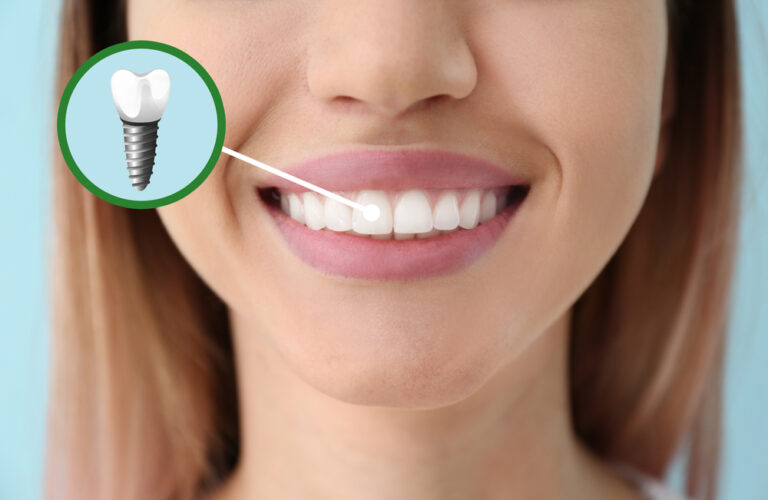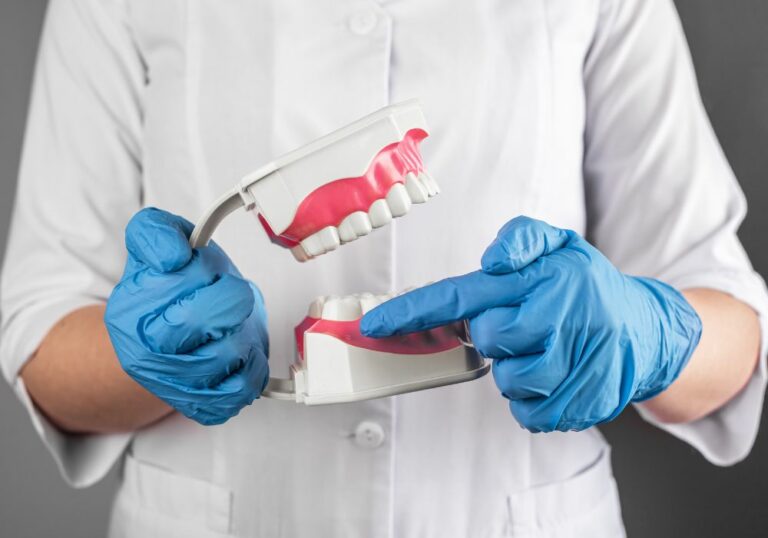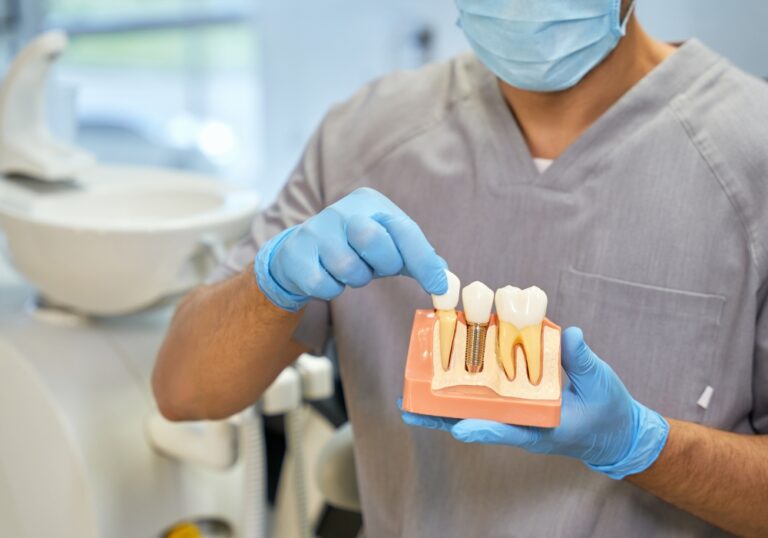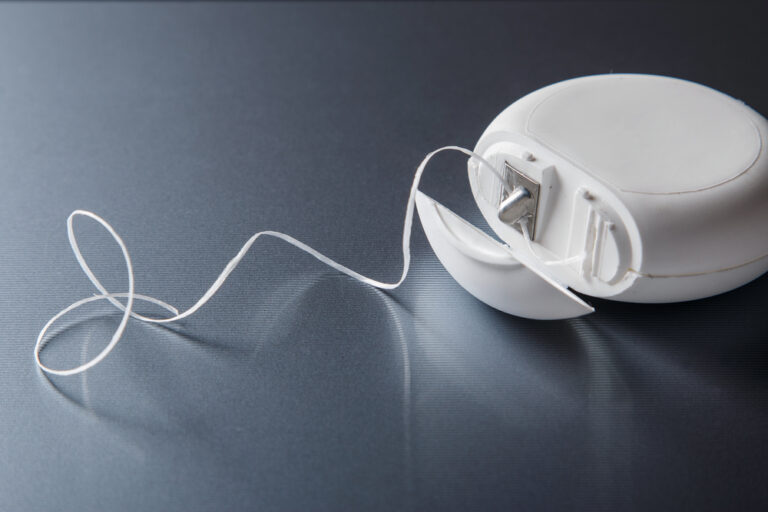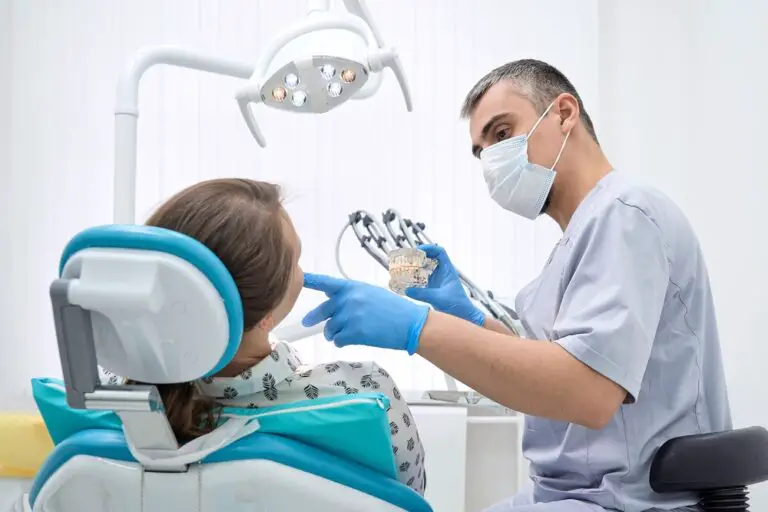Have you ever experienced that disheartening moment when you confidently brush your teeth – hoping for minty freshness, only to be met by bad breath shortly afterward? Well, we all have been there!
Bad breath is frustrating, especially when it starts affecting your relationships. Most people develop it due to poor oral hygiene. If they don’t brush their teeth regularly, bacteria can collect in the mouth and produce that awful smell.
But, if you have bad breath while practicing good oral hygiene, you must be feeling haunted by one question – why does my breath smell even after I brush my teeth?!
Don’t worry because we’ve got the answer as well as the solution to your problem. So, let’s dive in and discover the secrets to long-lasting oral freshness!
What is Bad Breath?
Bad breath, also known as halitosis, is an unpleasant odor that is produced by the mouth when a person exhales or speaks. It is surprisingly a common condition that can affect individuals of all ages.
According to Harvard’s study, almost 30% of the population complains about some type of bad breath. It can be after waking up in the morning, eating a garlicky meal, and even after having coffee.
However, most of the time, bad breath is temporary. It will go away after brushing your teeth or drinking some water to freshen up the mouth. If it lingers for more than 3 days, it will be classified as chronic bad breath.
This type won’t go away on its own – even if you brush, floss, or mouthwash regularly.
Why Does Your Breath Smell Even After Brushing Your Teeth?
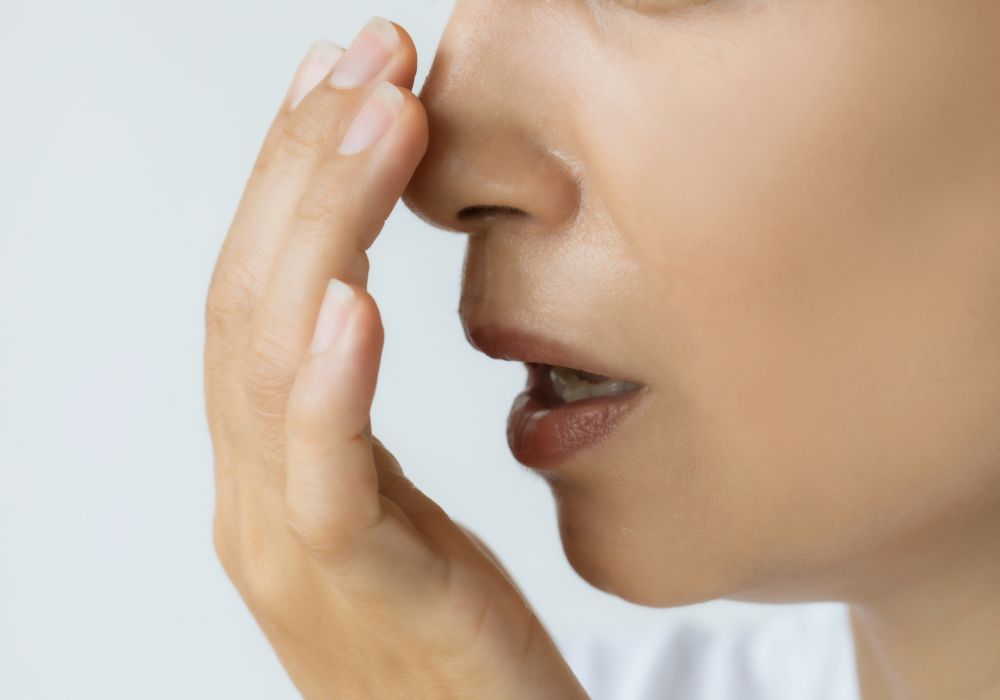
Temporary halitosis occurs because of bacteria buildup. When we don’t practice good oral hygiene, the food particles stay stuck on our tongue, teeth, and gums. This attracts bacteria to feed on the organic matter.
As bacteria break down food, dead cells, and other debris, sulfur compounds are released in your mouth. It is these sulfur compounds that produce the characteristic foul smell associated with bad breath.
But when you brush, this smell goes away instantly. So, why does your breath smell even after brushing or flossing your teeth?
Well, there is an underlying cause(s) to the problem. Let’s find out which one it is below!
1. Too Many Cavities or Gum Disease
Usually, a tooth cavity does not produce chronic bad breath. But if your mouth has too many cavities or the plaque buildup is extreme, it’s possible to experience a sulfur-like smell coming out from your mouth.
This may also happen if you have gum disease (also called gingivitis). It refers to when bacteria attack the gum line and trigger inflammation. You may notice redness, swelling, and occasional bleeding in the affected areas.
If you don’t get the gums treated quickly, gingivitis can turn into periodontitis.
2. Dry Mouth
A dry mouth is a condition where your mouth feels dry due to a lack of saliva. This may happen because:
- Your salivary glands aren’t working properly.
- You’ve taken certain medications, or
- You breathe through your mouth.
Whatever the reason may be, a sulfuric odor and parched feeling confirm a dry mouth. The easiest way to fix this is to drink a lot of water and chew sugar-free gum or an ice cube.
This will moisten your mouth (getting rid of bad breath) and stimulate the salivary glands to produce more saliva.
3. GERD
GERD is the short form of gastroesophageal reflux disease. It is a digestive disorder in which stomach acid keeps flowing back into the esophagus (tube connecting the mouth and stomach). This is also called acidity or chronic acid reflux.
If you’ve had this condition for some time, you can develop bad breath that smells like rotten eggs or sulfur. You may also experience a sour taste and heartburn.
4. Chain Smoking
Smokers develop bad breath due to cigarette smoke. The nicotine and tobacco stay in the system for hours – producing a stale smell every time a smoker speaks or exhales. But if you’ve got a habit of chain smoking, the smoke can dry up the palate (roof of the mouth).
This means lower saliva production and so, a dry mouth. The smell is more powerful than bad breath caused by a simple dry mouth, though.
5. Post-Nasal Drip
Sinus infections, flu, allergies, and strep throat are some of the common reasons why you can have a post-nasal drip. This refers to the mucus that drips from your nose to the throat. It can be of different colors, depending on your condition.
However, while you might not be able to point out the mucus type, you will noticeably feel it flowing down your throat. Having a post-nasal drip for a long time can attract bacteria, and trigger an infection.
This can give rise to a moldy or fungus-smelling breath.
6. Ketoacidosis
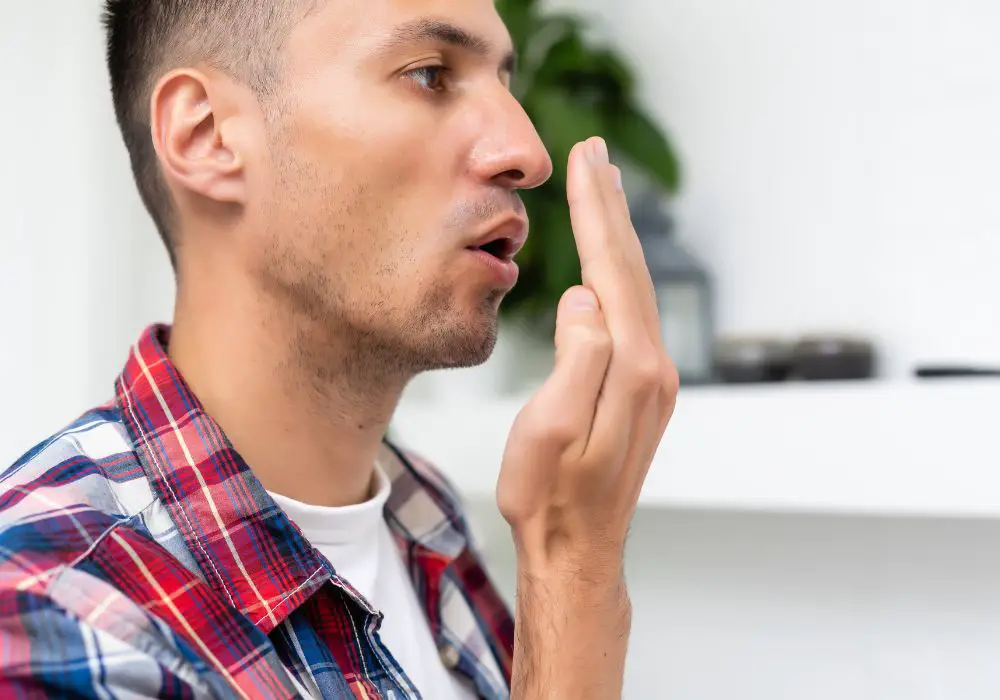
Ketoacidosis is a complication of diabetes (mostly in type 1 patients) that develops due to a severe lack of insulin. Since the body doesn’t have enough insulin, blood sugar isn’t able to enter the cells for energy production.
As a result, the body burns fats to keep things going. This produces ketones – a chemical compound responsible for the pungent fruity or sweet bad breath. People might also experience this if they haven’t eaten for a long time and their blood sugar level is low.
7. Bowel Obstruction
It sounds disgusting, but the bad breath that smells like poop or feces is a result of bowel obstruction. This is a digestive disorder in which your body is unable to excrete waste products.
Instead, the waste material builds up in your intestines and creates an obstruction. Other symptoms include belly pain, cramping, vomiting, feeling of fullness, and constipation.
8. Kidney Failure
Kidney failure occurs when your kidneys stop working properly. This means toxins aren’t being filtered from your bloodstream. As a coping mechanism, your body tries to remove these toxins from other excretory methods, like sweat and breath.
You’ll notice a stinking breath that smells like ammonia or fish. It’s best to visit the doctor immediately because kidney failure can be fatal.
9. Liver Failure
Liver failure is another life-threatening problem that can cause bad breath. When your liver stops functioning, the blood isn’t processed and protein isn’t synthesized. This can cause huge imbalances in the body.
Most people with liver failure notice a strong, musty bad breath that smells like a mixture of garlic and rotten eggs. Other symptoms include abdominal swelling, yellow skin, and disorientation.
10. Peptic Ulcers
A peptic ulcer refers to a sore on the lining of your esophagus, stomach, or small intestine. Although the ulcer itself doesn’t cause bad breath, Helicobacter Pylori triggers it.
Helicobacter Pylori (H.Pylori) is a bacterial infection that affects the stomach. The bacteria quickly multiply into your stomach and upper part of the small intestine — eating away the organ tissues. This leads to ulcers.
So, if you have got a peptic ulcer due to h.pylori, you will notice an acidic bad breath along with severe stomach pain and swelling.
| Important! When to See the Doctor?
Temporary bad breath can occur because of certain foods too. If you’ve eaten garlic, onion, or some other food with a strong smell, you can have bad breath for up to 72 hours. However, if your bad breath is persistent and doesn’t smell like regular food, there’s an underlying issue that you need to treat. It’s best to visit the dentist or doctor at your earliest convenience. |
How to Get Rid of Bad Breath After Brushing?

It’s easy to get rid of bad breath by brushing your teeth and tongue with fluoride toothpaste. You can also use mouthwash to quickly freshen up the mouth.
But if your bad breath persists and you need to interact with people (e.g. doctor), here are some home remedies:
1. Drink Water
Water lubricates your saliva glands and washes away any mouth debris. This will lessen the odor temporarily. So, you can carry a water bottle and sip frequently to keep the smell away.
2. Baking Soda
Along with being a cleaning agent, baking soda is known to be an excellent mouthwash too.
To use it, add 1 to 2 teaspoons of baking soda in a cup of lukewarm water. Mix and take a huge sip of the solution. Swish it vigorously in your mouth before spitting it out. Repeat until all of the prepared baking soda rinse is finished.
3. Fennel Seeds
Fennel seeds have an aromatic essential oil with antibacterial properties. So, when you chew fennel seeds, the oil secretes into your mouth and gets rid of smell-causing bacteria.
It also stimulates salivary glands to release more saliva. All of this reduces the mouth odor significantly.
Recap
Having bad breath is embarrassing. But if your breath stinks for more than 3 days, you should be concerned.
Still wondering – why does my breath smell even after I brush my teeth? Your answer lies in one of these health problems:
- Tooth decay or gum disease
- Mouth dryness
- GERD
- Chain smoking
- Post-Nasal drip
- Ketoacidosis
- Intestinal blockage
- Kidney failure
- Liver failure
- Peptic ulcers
You can temporarily get rid of the foul breath by drinking more water, baking soda rinse, and chewing fennel seeds. Once your bad breath seems a little under control, visit the doctor immediately to help treat the underlying health issue.

